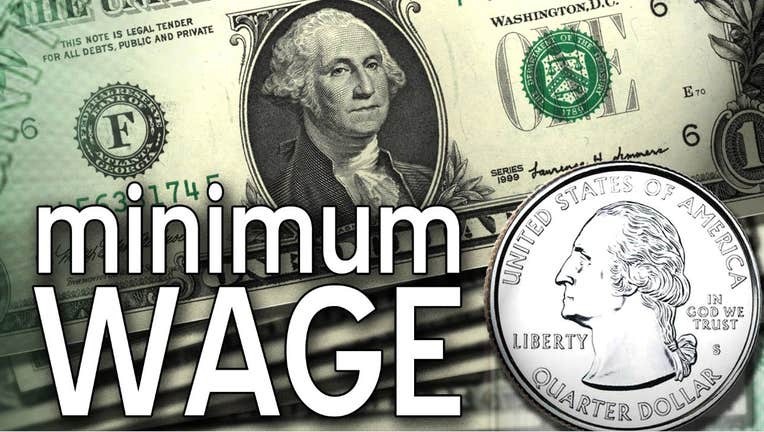Tucson voters to decide on higher minimum wage proposal

TUCSON, Ariz. - Voters in Tucson are being asked to approve a new minimum wage higher than the state's baseline pay, potentially joining Flagstaff in adopting the $15 per hour rate long sought by progressive Democrats.
The proposal on Nov. 2's city ballot would raise hourly minimum wages for workers inside the city limits to $13 on April 1, $13.50 on Jan. 1, 2023, $14.25 a year later and to $15 on Jan. 1, 2025. Voters are separately being asked to boost pay for the mayor and city council and choose three council members.
The state’s minimum wage is $12.15 per hour with annual boosts tied to inflation. The rate is set to rise to $12.80 per hour in January, so the proposed $13 per hour Tucson pay rate for next year is not significantly higher.
Flagstaff voters approved a higher city minimum wage in 2016. Wages there hit $15 an hour this year with yearly increases thereafter.
MORE: Minimum wage in Arizona increases to $12.15 an hour on Jan. 1, 2021
The measure is on the city ballot because a group called Tucson Fight for 15 gathered more than the 14,826 valid signatures to qualify the initiative. Backers argue that front-line workers who have long been left behind deserve a living wage.
"The pandemic increased the enormous gap between what minimum wage workers earn and the real cost-of-living," the executive director and board president of the Center for Economic Integrity wrote in a voter pamphlet argument.
Others who submitted arguments in favor of Proposition 206 include Pima County supervisors Matt Heinz and Adelita Grijalva, numerous local Democratic state lawmakers, labor union leaders and leaders of non-profit groups like the Community Food Bank of Southern Arizona.
The business community is united in opposition. The Tucson Metro Chamber, Arizona Restaurant Association and other groups argue the pay raise will harm small businesses, force all wages to increase and put businesses inside the city limits at a competitive disadvantage.
MORE: Arizona law means local minimum wage hikes may bear a cost
The new wage would be only slightly higher than the state minimum and yearly inflation boosts and market forces will bring wages to $15 without the measure, Guymon said.
"We would prefer to see a regional approach," Guymon said Oct. 28. "Obviously, ultimately we want to see a statewide approach, which we already have."
The campaign manager for Tucson Fight for 15 scoffed at those statements.
"Most of those arguments are sort of the standard any time we try to do anything good for low-income folks," said C.J. Boyd "There’s the gnashing of teeth and the wailing that this is going to destroy the economy and everyone’s going to suffer from it, and it’s just not true."
He pointed to studies showing that raising the minimum wage does not lead to jo losses.
Dan Bogert, chief operating officer for the state restaurant association, said there are much bigger issues than slightly higher wages. He pointed to the proposed law’s creation of a city enforcement department funded by business fees and new recordkeeping rules.
"It’s the bureaucracy that’s being created," Bogert said. "And quite frankly, in the city of Tucson right now I’m not sure you can find a job that’s offering to pay less than $15. I think it’s probably closer to $16 or $17, just to get people in the door."
Minimum wage increases have faired well with Arizona voters despite opposition from the business community and Republican state leaders. Voters approved a statewide wage increase in 2006 and again in 2016 by wide margins, and Flagstaff's increase also won that year.
Proponents have outraised and outspent opponents of the initiative. The Tucson Fight for 15 campaign said it raised nearly $250,000 through Oct. 15, most of it from labor unions and nonprofits. The No on 206 committee raised just $22,000.
The GOP-controlled state Legislature has tried to penalize cities for increasing their minimum wages. But a judge in an Oct. 11 decision blocked the state from collecting $1.1 million from Flagstaff to compensate for higher state costs to provide services for groups such as the developmentally disabled.
Maricopa County Superior Court Judge James Smith's decision sidestepped Flagstaff's request to find that the assessments are unconstitutional. But it removed an argument that Tucson may face higher costs if it passes its own higher wage law, at least in the short term.
In the pay raise matter, a citizen's commission recommended city council members' pay increase from $24,000 a year to $36,000 and the mayor's salary go from $42,000 to $54,000 per year, with annual inflation adjustments thereafter. If voters sign off, the raises would take effect after the 2023 council elections.
MORE: AZICA.gov: Frequently asked questions about minimum wage and earned paid sick time
Tune in to FOX 10 Phoenix for the latest news:
Sign up for FOX 10 email alerts, newsletters
Get breaking news alerts in the FOX 10 News app. It is FREE! Download for Apple iOS or Android.

